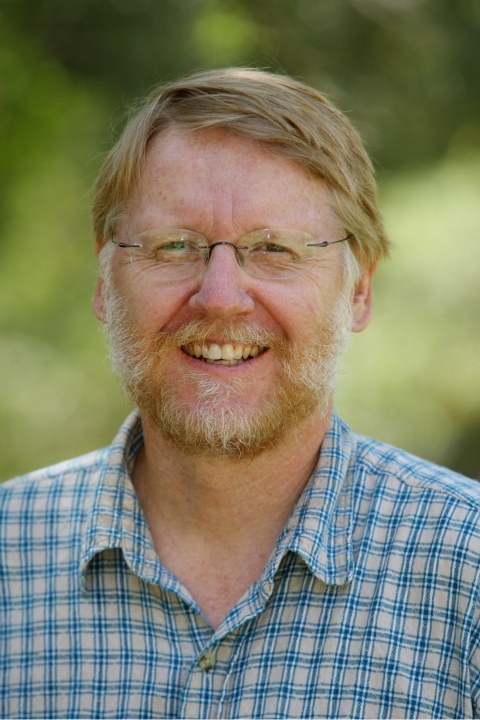A Chat with Paul J. Willis
Santa Barbara's New Poet Laureate On His Past, His Craft, and Community Issues
Created to advance an appreciation for arts and humanities throughout the community, Santa Barbara’s honorary poet laureate position is awarded every two years to an accomplished local poet active in literary circles. The laureate receives an honorarium of $1,000 per year, and participates in outreach by attending public functions as well as holding workshops and readings at area schools.
For Paul J. Willis, Santa Barbara’s newest poet laureate, his duties go further. Willis, an English professor at Westmont College, sat down with The Independent to explain that his primary goal is to encourage others to write. Inspired by nature, faith, and interactions with others, Willis’s poetry reflects solitude as well as public life. Willis also explains the process of becoming a laureate, and his opinion on a host of relevant local issues.

How did this happen? How did you get this title?
You can’t nominate yourself, so other people nominate you and they need to secure your permission. The city puts out a call for nominations; there were seven nominees and an ad hoc selection committee. I was unanimously chosen by that committee, and they made a recommendation to the City Arts Advisory Community, who approved it unanimously. Then it goes to the City Council who votes. [The decision] is based on the quality of my poetry, the ways in which my work has been recognized, my commitment to teaching and community involvement, and the comments of the recommenders.
Who did you have to compete with?
There are a number of very fine poets who would qualify for this position, but I don’t know who else I was competing against. I see it more as taking my turn than winning. I feel honored people think it’s time I take my turn, but I am under no illusions. And I think very highly of all of the past laureates that are poets in the community, so I want to keep up that tradition.
Did you have to bribe anybody or endorse any councilmember?
No, I didn’t. And I did not actively seek this nomination. The various nominators came to me independently. I’ve looked at the list of people on these committees, and I am acquainted with only a small fraction anyway.
What is your position on the gang injunction?
Having some practice in writing poetry does not make me a local political expert, but the gang problem in Santa Barbara has proved intractable. I understand the desire to try new approaches since old approaches have not worked as well as we hoped.
What is your position on increased housing density?
My guess is that a trade-off exists between the aesthetics of our downtown area and the suburban sprawl in outlying areas. In theory, I would be for concentrating population downtown. I’m part of suburban sprawl; I live in faculty housing at the end of Westmont Road. And I think a geographic fact of Santa Barbara is that houses in outlying areas are built in dangerous fire zones, so the closer you get to downtown, the safer you are. The fact is that the outskirts of Santa Barbara are where hot winds blow through highly flammable vegetation every year. So the fire has made me think about Wendell Berry, the Kentucky Berry Farmer, who writes about how many years it takes for a culture to adapt to a landscape.
In California it might take several generations more before we stop building in places that will be swept by wildfire. But the thing about California is that we create cultural fantasy lands; we literally have one in Disneyland, Michael Jackson’s Neverland, and the many Montecito estates, including the fantasyland of Westmont’s campus. We think it’s its own space unaffected by what is outside, but wildfire reminds us we are a part of the larger ecosystem. We need to be aware of that. So it’s not only the aesthetics of suburban sprawl verses urban density, but it also has to do with learning to deal with wildfire in our unique environment.
What type of poetry do you like to write?
In terms of form, I enjoy both free verse and formal verse. The fact that those choices are sometimes politicized is lamentable. I think any good poet should have skill in both, and be able to exercise that skill in both. It’s a little limited when you get right-wing magazines that say they only want formal verse and they don’t want poetry about Salvadorian refuges or saving the whales — that’s a little limited. And when you get left-wing magazines that won’t look at anything in rhyme — that’s unfortunate too. And there are poets who think that poetry and poetry readings should be completely solemn — and that’s a mistake. Sometimes when I think of the poets who influenced me, I think of the three Williams: Shakespeare, Wordsworth, and Stafford. Something I like about Shakespeare is that he’s not afraid to be funny. Wordsworth’s attention to nature has deeply influenced me. And Stafford, I heard him read twice. I met him once at USCB during his last reading in Santa Barbara — May of 1993. He died in August of 1993.
I read a lot of his books when I was learning to write, and I still do; to me there’s a uniquely encouraging spirit there. There’s a lot of craft. The poems themselves are gifts to the reader as every good poem should be. But it’s the gift in the poem to the person that says: “You can try this too.” I never felt that before, that sense of encouragement. But [Stafford] believed that poetry was a life-giving activity for anyone. He wanted people to not worry, at least initially, about perfection. He wanted people to get words on the page. I host a William Stafford reading every year and have done so for five years, and want to continue doing that out of gratitude.
What do you want to do with this role?
I think anything I could do to encourage people to take those moments to write, to feel a new connection to themselves and the world around them, and to feel a sense of pleasure in the words they put down on the page — that’s what I want to see happen. It’s not a publicly spectacular thing, so it’s hard to know what that will mean. Poetry is a very private practice. Not to diminish what can happen in public readings and workshops, but like Izaak Walton said — he was a funny guy in the 17th century that wrote a book called The Compleat Angler — “Study to be quiet.” So, I think that encouraging people in this age of technological distraction to experience silence and to think and write and collect themselves is the point. Doing that in a public role is a little oxymoronic. But I love watching students gain a sense of themselves and what they can say in a writing class, and by extension I want to help that happen in the community however I can.
In terms of subject matter, I get labeled as a nature poet. I do a lot of hiking around, and I write a lot of poems outdoors. But in a public reading, I mostly read poems about other people, and I think it’s our encounters with others that often stir us. A lot of my poems are faith related — not in a proselytizing way — but that’s a lot of who I am. I would say that that doesn’t mark a change from other poet laureates. So that’s part of the whole person I bring to my poetry. There’s a saying from Wallace Stevens: “Poetry is a response to the daily necessity of getting the world right.” I’ve liked that for a long time, because there’s a sense that each of us needs something to get us equilibrium with the world every day. My son is a drummer, and I watch the way he listens to and performs music, and that is his means. Some people are afflicted with words and some people want to express that in a condensed meaningful way, and that’s poetry. I like poetry that is reasonably accessible, and I think we see more of that lately with people like Ted Kooser and Billy Collins. People like them have done a lot to restore a popular audience to poetry, an audience that was lost with the modernists. I enjoy a narrative element in poetry.
How long have you been writing poetry?
Since the late ‘80s. For 20 to 25 years.
How did you get into poetry?
I started writing fantasy novels in graduate school, and during my first full-time teaching job in New York I was sort of wondering who I was going to be — a scholar, or a creative writer? The people in the department who I had become better friends with were the creative writers. And I wonder how many of our interests are developed through relationships like that. We ate breakfast every week and they were poets, so they’d bring in poems. I continued writing fantasy novels, and as I started writing poems, the novels got shorter. Some of these novels were just published in December in The Alpine Tales.
I gradually felt a little more investment in poetry than fiction. And it also fit better into an academic schedule. It’s a very sad feeling to start classes in September with half of a novel written. You realize you won’t have the time to re-invest yourself for a while. But with poetry you can wake up early in the morning and write something, and feel some measure of completeness. I think of William Carlos Williams, a physician who wrote poems on his prescription pads between patients. When I came to Westmont in 1988, I attended the Santa Barbara Writers’ Conference in 1989, and went to the poetry workshop led by Perie Longo and she was really helpful. So every once in a while someone will say they like the narrative element in my poetry, and I realize writing those fantasy novels got me somewhere. Same with when I write essays and people like their lyrical aspect. The genres inform each other.



